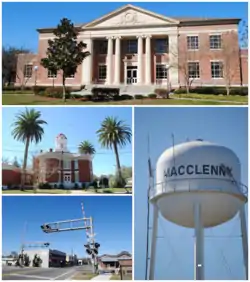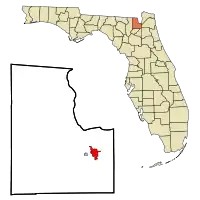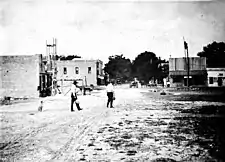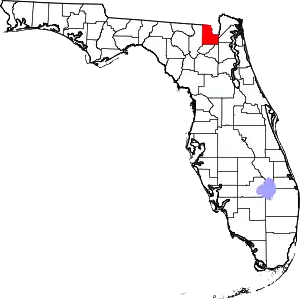Macclenny, Florida
Macclenny is a city and the county seat of Baker County, Florida. Located just west of Jacksonville, it is one of the principal municipalities comprising Greater Jacksonville. The population was 7,304 at the 2020 census,[4] up from 6,374 in 2010.[5][6]
Macclenny, Florida
McClenny Florida | |
|---|---|
 Top, left to right: Baker County Courthouse, Old Baker County Courthouse, railroad crossing in the historic district, water tower | |
| Nickname: Baker County's Medium size City | |
 Location in Baker County and the state of Florida | |
| Coordinates: 30°17′N 82°7′W | |
| Country | |
| State | |
| County | Baker |
| Government | |
| • Mayor | Edward Linarm |
| Area | |
| • Total | 4.87 sq mi (12.60 km2) |
| • Land | 4.87 sq mi (12.60 km2) |
| • Water | 0.00 sq mi (0.00 km2) |
| Elevation | 131 ft (40 m) |
| Population (2020) | |
| • Total | 7,304 |
| • Density | 1,501.03/sq mi (579.57/km2) |
| Time zone | UTC-5 (Eastern (EST)) |
| • Summer (DST) | UTC-4 (EDT) |
| ZIP code | 32063 |
| Area code | 904 |
| FIPS code | 12-41950[2] |
| GNIS feature ID | 0286243[3] |
| Website | www |
History

Macclenny was first called Darbyville because most of the land of this area was owned by the Darby family. Carr Bowers McClenny married into the Darby family, and then bought most of this land in the late 19th century, intending to harvest it for timber.
Darbyville became known as McClenny. McClenny developed many businesses there related to lumber: harvesting the wood, sawmills to process it, turpentine, and land. The town name McClenny was changed to the current name of The City of Macclenny because the post office department had a rule against using capital letters in the middle of a name. The first post office in Macclenny was established in 1890.
There were settlers in Macclenny as early as 1829, but it was not until after the Civil War that more people began to settle there. In 1888 most of the town residents were killed in a yellow fever epidemic. The population was 334 in 1890 (see census table below). The town gradually recovered.[7]
By 2000, residents increased to 4,500. The 2016 population was estimated at 6,562. (See census table below).
Geography
Macclenny is located in eastern Baker County at 30°17′N 82°7′W,[8] 28 miles (45 km) west of downtown Jacksonville. U.S. Route 90 (Macclenny Avenue) runs through the center of town, and Interstate 10 passes through the southern tip of the town, with access from Exit 335 (State Road 121). Lake City is 32 miles (51 km) to the west, and the Florida–Georgia border is 6 miles (10 km) to the north.
According to the United States Census Bureau, the city has a total area of 4.7 square miles (12.3 km2), all land.[5]
Demographics
| Census | Pop. | Note | %± |
|---|---|---|---|
| 1890 | 334 | — | |
| 1900 | 350 | 4.8% | |
| 1910 | 388 | 10.9% | |
| 1920 | 350 | −9.8% | |
| 1930 | 519 | 48.3% | |
| 1940 | 771 | 48.6% | |
| 1950 | 1,177 | 52.7% | |
| 1960 | 2,671 | 126.9% | |
| 1970 | 2,733 | 2.3% | |
| 1980 | 3,851 | 40.9% | |
| 1990 | 3,966 | 3.0% | |
| 2000 | 4,459 | 12.4% | |
| 2010 | 6,374 | 42.9% | |
| 2020 | 7,304 | 14.6% | |
| U.S. Decennial Census[9] | |||
At the 2000 census there were 4,459 people in 1,548 households, including 1,140 families, in the city. The population density was 1,354.9 inhabitants per square mile (523.1/km2). There were 1,644 housing units at an average density of 499.5 per square mile (192.9/km2). The racial makeup of the city was 75.89% White, 21.87% African American, 0.36% Native American, 0.67% Asian, 0.07% Pacific Islander, 0.45% from other races, and 0.70% from two or more races. Hispanic or Latino of any race were 2.47%.[2]
Of the 1,548 households 38.4% had children under the age of 18 living with them, 49.5% were married couples living together, 20.5% had a female householder with no husband present, and 26.3% were non-families. 23.0% of households were one person and 10.7% were one person aged 65 or older. The average household size was 2.70 and the average family size was 3.17.
The age distribution was 28.9% under the age of 18, 12.4% from 18 to 24, 25.5% from 25 to 44, 18.8% from 45 to 64, and 14.4% 65 or older. The median age was 32 years. For every 100 females, there were 90 males. For every 100 females age 18 and over, there were 85 males.
The median household income was $31,895 and the median family income was $37,091. Males had a median income of $26,775 versus $19,573 for females. The per capita income for the city was $14,909. About 17.1% of families and 20.9% of the population were below the poverty line, including 37.4% of those under age 18 and 10.2% of those age 65 or over.
References
- "2020 U.S. Gazetteer Files". United States Census Bureau. Retrieved October 31, 2021.
- "U.S. Census website". United States Census Bureau. Retrieved January 31, 2008.
- "US Board on Geographic Names". United States Geological Survey. October 25, 2007. Retrieved January 31, 2008.
- "Macclenny city, Florida". U.S. Census Bureau. Retrieved May 4, 2022.
- "Geographic Identifiers: 2010 Demographic Profile Data (G001): Macclenny city, Florida". U.S. Census Bureau, American Factfinder. Archived from the original on February 12, 2020. Retrieved October 18, 2013.
- "Find a County". National Association of Counties. Retrieved June 7, 2011.
- "McClenny Family Website". mcclenny.org. Retrieved July 16, 2014.
- "US Gazetteer files: 2010, 2000, and 1990". United States Census Bureau. February 12, 2011. Retrieved April 23, 2011.
- "Census of Population and Housing". Census.gov. Retrieved June 4, 2015.
External links
- City of Macclenny official website
- Baker County Press, newspaper that serves Macclenny, Florida, available for free in full-text with images in Florida Digital Newspaper Library

